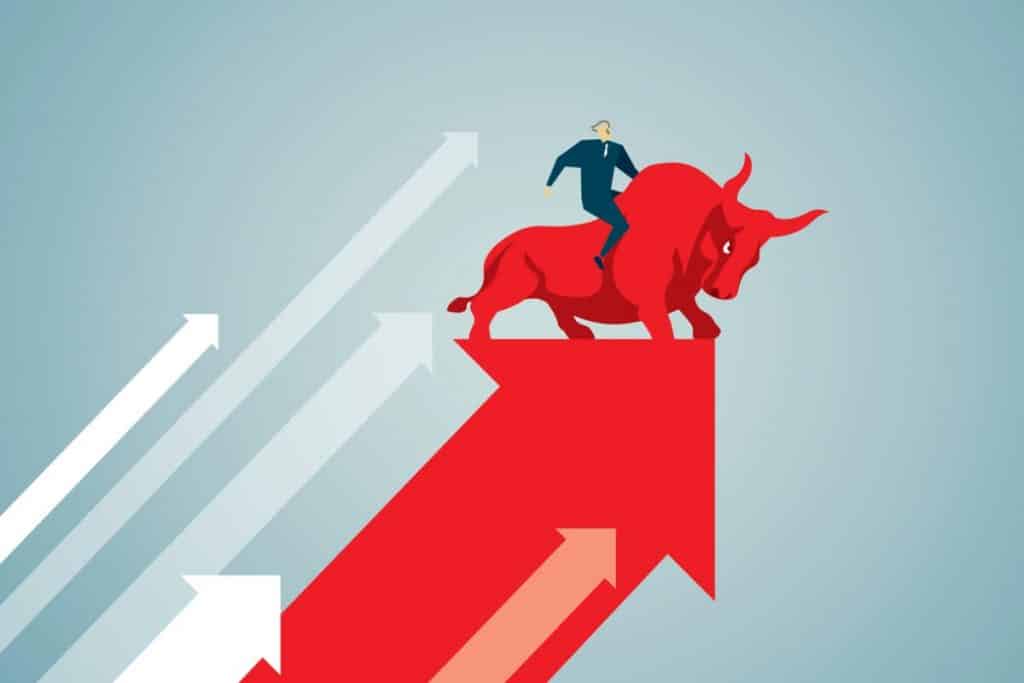What is a bull market?
A bull market is a market in which prices are rising or are expected to rise. The word is widely used by crypto investors in contrast to the term bear market, a market where most stocks are declining in value. Usually, it’s quite easy to profit in a bullish market, no matter which crypto asset you choose to invest in. However, it always pays to understand the logic behind a bull market to maximise your profits.

Is it possible to lose in a bull market?
During a bullish market phase, it’s hard to make any losses. And since the crypto industry is still young and sometimes irrational, investing in just about anything may bring you big profits.
However, it’s important not to get too attached to the assets you invest in and be able to get rid of them in time. It’s not uncommon for cryptocurrencies to have their price rise by more than 100%, and it’s obvious that this can’t last long.
Also, when a bullish market comes to an end, all baseless projects suffer a huge correction. It’s also likely that scams, which thrive during bull markets, will be exposed, their capitalisation dropping to zero when the first crypto investors sell their tokens to limit the losses.
When does a bull market end?
In the crypto world, it’s almost impossible to tell when a bull market will end. Usually, when all digital assets have grown in value and those who know nothing about the blockchain get into the market, it’s time to start asking questions.
Those who invest professionally generally take a stand well before individual investors. If you hear more and more non-professional people talking about a promising investment, it usually means that it’s already too late.
Of course, this is not a 100% accurate strategy. It’s quite possible that it’s only the beginning of a bull market and that there’s still a long way to go. However, be careful, because crypto investments can easily reach -90 % in just a few weeks in a bearish market.
When should you await a bullish phase?
It’s extremely difficult to predict when we are going to enter a bullish period. Oftentimes, this happens when all investors lose faith in the market and no longer dare to invest in crypto. This is called a market capitulation. From that point on, prices can’t go down because everyone who wanted to sell has already done so.
A bullish period can also be set in motion by good news, especially about favourable legislation in a big country like the US or China. Professional investors who couldn’t legally invest in crypto can do so now, and with more protection in place due to mainstream recognition, others are also encouraged to try their hand at digital currencies.
Regardless, you should be careful and never invest all your money at once, even when you think you are entering a new bullish phase. It’s not always easy to assess the number of people who have already capitulated or those ready to invest large sums in the market.
Conclusion
The bull market is, by far, the most popular market phase among crypto investors since it usually allows everyone to profit, even without necessarily knowing much about crypto or finance in general.
Nevertheless, it’s important to know how to avoid the many scams that will inevitably appear during this time and have an exit strategy for investments that have already made you quite a bit of money, so you can secure your profits.
Maximize your Cointribune experience with our "Read to Earn" program! For every article you read, earn points and access exclusive rewards. Sign up now and start earning benefits.
J'ai découvert le monde des cryptomonnaies en janvier 2018. Arrivé au pire moment pour investir, je n'ai depuis lors jamais cessé de me former et partage désormais mes connaissances afin de faciliter l'adoption des cryptos.
The views, thoughts, and opinions expressed in this article belong solely to the author, and should not be taken as investment advice. Do your own research before taking any investment decisions.